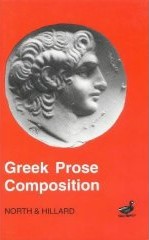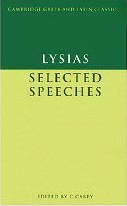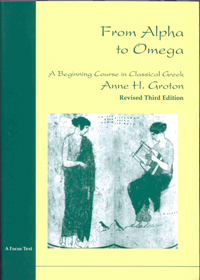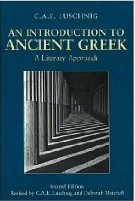Greek 3: The Saga Continues in Ancient Greek (2009 Spring UCSC)
Notes on a 2009 course taught by Dr. Thomas Walsh
ΧΑΡΙΣ
ΣΟΙ
Ο
ΔΙΔΑΣΚΑΛΕ
WALSH
GRATITUDE TO YOU, O TEACHER
WALSH
Highlights of third 10-week Ancient Greek class:
Best translation practices
Text translation, with aid of grammar, dictionary, and a net:
- Know or look up (or estimate in an exam!) the vocabulary of the sentence.
- Work sentence-by-sentence at first.
- Scan a sentence, looking for and resolving unknown vocabulary.
- Scan to identify verb and participles and subjects of verbs.
- Make a literal translation.
- Scan backwards for parts of speech, to avoid being 'mesmerised by vocabulary'.
- Convert into correct and natural English.
Sight-reading: netless translation:
Additional advice for sight reading without a net or your
worthy
An Intermediate Greek-English Lexicon
by H. G. Liddell and Robert Scott:
- Make strong use of what you know to give you the gist of the material.
- Scan to identify verb and participles and subjects of verbs.
- Use information that you know to guide you to the most plausible interpretation for what you do not know.
- Convert into correct and natural English.
Day 3.1
Day 3.2.
- Identified verbs and participles in last four sentences/sections [47 - 50] of
Lysias.
- Translation of first half of sentence 47 of
Lysias.
Day 3.3
- Small-group work on translating of rest of sentence 47
and sentences 48 - 50 of
Lysias.
Day 3.4
- Demonstrative adjectives for:
- such quality (such a thing; this kind of thing).
- such quantity (so great a thing; this much of a thing).
- Further work on translating 47 - 50 of
Lysias.
Day 3.5
Day 3.6
Day 3.7
Day 3.8
- Translating sentence 1 of Lysias.
-
Comparative adjectives:
| Positive (basic form)
| Comparative (more X; X-er)
| Superlative (most X; X-est)
|
- When Positive adjective has a Penult that is long (contains a double vowel or diphthong or
contains a short vowel followed by a double consonant (Ζ or Χ or Ψ)
or two or more consonants, example:
then the comparative adds endings (M/F/N):
- When Positive adjective has a Penult that is short, example:
then the vowel preceding the endings is lengthened:
| Comparative: φοβερωτεροσ
| Superlative: φοβερωτατοσ
|
- Some adjectives compared with:
| Comparative: -íων
| Superlative: -ιστοσ
|
- Some adjectives have irregular comparatives and superlatives.
Day 3.9
Day 3.10
Day 3.11
- Greek Grammar: RIP: Relative Indefinite Pronoun.
- Completed translating sentence 3 and started translating sentence 4 of Lysias.
Day 3.12
Day 3.13
- Quiz on RIP: Relative Indefinite Pronoun.
- Completed translating sentence 5 and started translating sentence 6 of Lysias.
Day 3.14
- Sight reading: Lucian's description of a voyage by Greeks to the Moon,
where they met Endymion and his horse-vultures and other minions.
- Greek Grammar: purpose clause:
- Translated as "IN ORDER TO".
- Also called "final clause".
- When the verb in the main clause is of:
- present or primary tense, then the verb of the purpose clause is in the subjunctive
("closer and more real").
- present or secondary tense, then the verb of the purpose clause is in the optative
("less vivid").
- Completed translating sentence 6 and started translating sentence 7 of Lysias.
- Homework:
Day 3.15
- Translation of purpose clauses as in previous homework.
- Greek Grammar: Aorist passive:
- 6th principle part.
- Diagnostic θ in (first aorist) thematic ending.
- Be able to recognize:
- Indicative (6 voice/number).
- Subjunctive (6 voice/number).
- Optative (6 voice/number).
- Imperative (4 voice/number).
- Infinitive (1)
- Participle (3 genders, each with sg/pl for 4 parts of speech).
- Completed translating sentences 7 and 8 and started translating sentence 9 of Lysias.
- Homework:
- Turn in assigned
sentences written in Greek from Exercise 7 of :
Greek Prose Composition
by M. A. North and A. E. Hillard (Editors).
- Prepare for quiz on writing a synopsis of Aorist passive, e.g. for 3rd person singular.
- Write up your final translation of sentence 6 of Lysias.
|

|
Day 3.16
- Completed translating sentences 9 and started translating sentence 10 of Lysias.
- Review of last week's quiz and homework on translation into Greek.
Day 3.17
- Quiz on Aorist Passive.
- Sight reading: Herodotus.
- Non-enclitic verb:
with root:
Day 3.18
- Reviews in class and turn in assigned
sentences written in Greek from Exercises 10 and 11 of :
Greek Prose Composition
by M. A. North and A. E. Hillard (Editors).
- Completed translating sentence 10 and started translating sentence 11 of Lysias.
- Homework: Write up your final translation of sentences 11-12 of Lysias.
|

|
Day 3.19
Day 3.20
- To sentence 14 of Lysias.
- Prepositions overview handout.
Day 3.21
Day 3.22
Day 3.23
- Completed translating sentence 16 of Lysias.
Day 3.24
- In-class conjugation aloud of nouns:
|
λóγοσ
| Second declension
| Word; account; reason
|
|
δíκη
| First declension
| Justice
|
|
ελπíσ
| Third declension
| Hope; expectation.
|
- Pronouns: handout showing:
- Definite article
- Demonstrative pronouns
- Interrogative and indefinite pronouns
- Personal and intensive pronouns
- Reciprocal pronouns
- Reflexive pronouns
- Relative pronouns
- Completed translating sentence 17 of Lysias.
- Homework: review pronoun chart.
- Homework: get used to translating 5 lines of Greek per day.
Day 3.25
- QUIZ:
- Conjugate οïδα
(SMOOTH breathing).
- Vocab of Lysias paragraph 6.
- Review of -MI verbs so far.
- Future Conditions: should/would."if ... then ...":
| "if ... then ..."
| PROTOSIS
| APODOSIS
|
Future more vivid
"if A does X (e.g. teaches)
then B will Y (e.g. will pay)"
|
εαν
(or ην or αν)
(all with smooth breathing)
plus Subjunctive
|
Future indicative
or equivalent
|
Future less vivid
"if A should do X (e.g. should teach)
then B would Y (e.g. would pay)"
|
ει
(smooth breathing)
plus Optative
|
Optative
with αν
(smooth breathing)
|
- Completed translating sentence 18 of Lysias
Day 3.26
- Review "future more vivid".
Reminder: optative takes secondary endings.
And get over the mismatch of tense in translation: don't have to use FUTURE
to translate FUTURE MORE VIVID.
- Prepositions and preverbs: handout.
- Another -MI verb:
- Assignment: learn present and future of
íημι (ROUGH BREATHING).
- Completed translating sentence 19 of Lysias
and began sentence 20.
Day 3.27
- "Small word" handout.
- General conditions: always happen; translate as "if ... then ...":
| "if ... then ..."
| PROTOSIS
| APODOSIS
|
Present General
"if/when A does X (e.g. teaches)
then B does Y (e.g. pays)"
|
εαν
(or ην or αν)
(all with smooth breathing)
plus Subjunctive
|
Present Indicative
|
Past General
"if/when A did X (e.g. taught)
then B did Y (e.g. paid)"
|
ει
(smooth breathing)
plus Optative
|
Imperfect Indicative
|
- Completed translating sentence 20 of Lysias
and began sentence 21.
- Assignment: disambiguate the 24 small words listed.
Day 3.28
- Quiz on conditional sentences and -MI verb in present and imperfect.
- -MI verbs with prefixes.
- Handout based on Crosby and Schafer, summarizing all the grammar we should know at this point.
- Completed translating sentence 21 of Lysias
and began sentence 22.
Day 3.29

Cake and photos by baker
and Greek student Celeste Noche.
|

|
- Review of previous quiz on conditional sentences and -MI verb in present and imperfect.
- Completed translating sentences 22 and 23 of Lysias.
- Greek vocab handout of words in Lysias (from Perseus at Tufts);
arranged by frequency of occurrence.
- Outline of final.
- Assignment: memorize all Greek vocab
occurring more than 3 times in Lysias;
expand this total of 127 to 140 by adding the first 13 words that occur 3 times.
Day 3.30
- Special add-on revision class for final.
Vocabulary growth
Greek vocab of Lysias (from Perseus at Tufts):
- 2423 words.
- 565 unique words.
- 292 words occur only once.
- 13 words occur more than 24 times (i.e. are more than 1% of total instances),
combining into a running total of 35%.
- 39 words (i.e. 26 more words) occur more than 11 times (i.e. are more than 0.5% of total instances)
combining into a running total of 53%.
- 72 words (i.e. 33 more words) occur more than 6 times (i.e. are more than 0.3% of total instances)
combining into a running total of 64%.
- 102 words (i.e. 30 more words) occur more than 4 times (i.e. are more than 0.2% of total instances)
combining into a running total of 71%.
- 127 words (i.e. 25 more words) occur more than 3 times (i.e. are more than 0.16% of total instances)
combining into a running total of 75%.
About 200 words from
vocabulary assigned in Greek I: Introduction to Ancient Greek.
About 200 words from
vocabulary assigned in Greek II: Introduction to Ancient Greek.
But of course exposure to many more.
Midterm
Final
- Orals: sight-read aloud half a dozen lines.
Pay attention to breathing, double consonants, consistency of pronunciation
(particularly vowels, diphthongs, and iota-subscripts).
- Translation: two passages (each 5-10 lines)
from Lysias
from sections 1.5 to 1.23 and 1.47 to 1.50.
- Answer questions on grammar in underlined sections of the above passages.
- Grammar and paradigms. Includes:
- Give paradigms.
- Identify forms.
- Identify various conditional and purpose clauses.
- Give the 6 principle parts and meanings for 6 verbs.
- Vocab of Lysias (from Perseus at Tufts):
you will be given the list of words from #60 to #140, which are 81 words
that occur from 4 down to 7 times, plus a few that occur 3 or 8 times.
Know as many as you can!
Highlights of earlier classes
Highlight of second 10-week Ancient Greek class,
Greek II: The Saga Continues in Ancient Greek:
Highlight of first 10-week Ancient Greek class,
Greek I: Introduction to Ancient Greek:
References
 [Thanks for visiting.]
[Thanks for visiting.]







